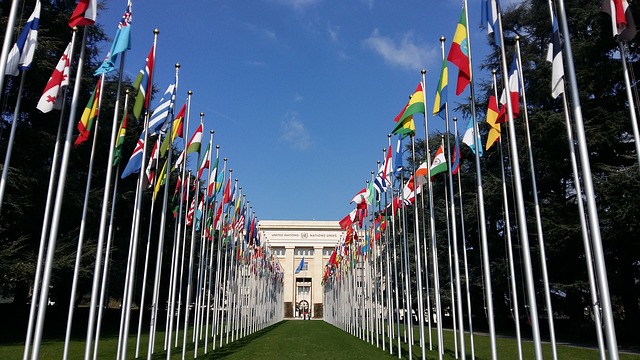Reading’s Professor Rosa Freedman and Professor Aoife O’Donoghue of Durham University consider the legacy of the late former UN Secretary-General in a new post for The Conversation.

The passing of Kofi Annan, former United Nations Secretary-General and Nobel Peace Prize laureate, has been met with tributes from all around the world. His home country, Ghana, declared a week of national mourning.
Annan rose through the ranks of the UN to become the first black African to head the organisation, and his many achievements are rightly being celebrated. Under his tenure, human rights and development were put at the forefront of all UN work, ensuring that the organisation focused on all people in all parts of our global society. Courageously, he was also the first UN Secretary-General to recognise and condemn the UN’s disproportionate focus on Israel as a human rights violator compared to many other similar or worse offenders.
It is also right to remember that on his watch, the UN’s reputation was tarnished by two of its worst stains. He was head of UN peacekeeping at the time when genocides were perpetrated in Rwanda and the Former Republic of Yugoslavia while UN peacekeepers stood by and did nothing, and he was in charge of the UN during the oil-for-food scandal in Iraq.
But as a whole, Annan’s life and work will nonetheless be celebrated for a long time to come.
A life well lived
Kofi Annan was born on April 8 1938 in Kumasi, Ghana, which was, at the time, part of the British Empire and known as the Gold Coast. His family were traditional rulers and his father a provincial governor. Ghana’s independence was secured when Annan was in his final year of secondary school. He attended a national university, followed by studying in the United States on a Ford Foundation scholarship. After his studies, Annan took a job at the World Heath Organization and began his lifelong career at the UN.
There are many ways in which he changed and improved the world through his work at the UN, and indeed in the positions he took after his retirement. During his tenure as Secretary-General he reformed the UN’s human rights system, in particular by establishing the modern Human Rights Council. His commitment to ensuring development around the world and to establish the principle that no-one be left behind culminated in the Millennium Development Goals, the forerunner of today’s Sustainable Development Goals.
Annan focused intensely on peace and security, ensuring that UN member states accepted the Responsibility to Protect doctrine. This political mandate emphasises that the UN, and particularly its peacekeeping personnel, must prioritise protecting civilians in conflict and crisis zones. Its creation was a direct response to the UN’s failure to protect civilians in Rwanda and the Former Republic of Yugoslavia, where genocides, war crimes and crimes against humanity were perpetrated while peacekeepers stood and watched. At that time, Annan was Under-Secretary-General for peacekeeping, and it raised eyebrows when he was appointed Secretary-General immediately afterwards. He replaced Boutros Boutros-Ghali, who was not reappointed for a second term – in no small part because of the terrible failures under his leadership.
Annan further strengthened the role of the UN Secretary-General’s role in peacefully settling disputes and came close to securing a settlement in Cyprus. He spoke out against the invasion of Iraq in 2003. But as Secretary-General, he also oversaw the staff members at the heart of the oil-for-food scandal in Iraq, a scheme intended to get food and vital supplies to Iraqi citizens but which also fell prey to corruption on a grand scale. While he was cleared of direct involvement, questions continue to be asked as to what he knew and when, and whether he could and should have done more.
The good and the bad
All in all, this makes for a complicated biography. While his appointment as the first black African Secretary-General was undeniably a breakthrough moment for representation at the UN’s top echelons, he failed just as his predecessors did to bring about the long-promised parity of gender, ethnicity and class that the UN structure badly needs. And those failures – particularly to appoint more than a few women to senior roles – undermine the UN’s claim to uphold the obligation under its own Charter to represent “we the peoples”. Still, he did more than his predecessors or immediate successor, for example appointing Mary Robinson as High Commissioner for Human Rights and Edward Mortimer to assist with his UN reform agenda – an agenda far more wide-reaching than any before or since.
After retirement, Annan continued his work for the UN, including as Special Envoy on the Syrian crisis and Chair of the Advisory Commission on Rakhine State, Myanmar. This body played a major part in keeping the peace there in ways that seem tragically elusive today. He was also a member of the Elders, a group of senior people from around the world that has included Mary Robinson, Nelson Mandela, Ela Bhatt and Jimmy Carter, all of whom use their reputations to attempt to bring peace to troubled parts of the world.
Tributes are being paid to Annan from within the UN and from leaders and peoples around the world. As Secretary-General he used his platform to effect meaningful change for billions of people across the world. His was a life well lived, and his legacy will live on.
Rosa Freedman is Professor of Law, Conflict and Global Development in the University of Reading’s School of Law.
